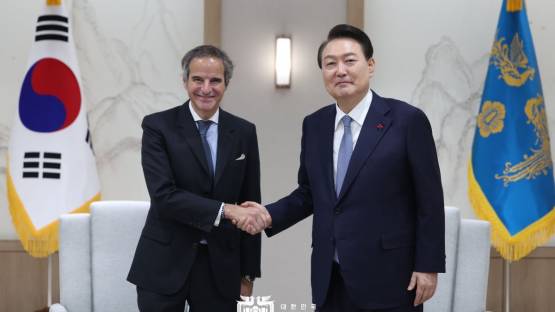The Republic of Korea (RoK) is a staunch supporter of the IAEA’s mandate, a strong regional partner for nuclear non-proliferation and a major player in the nuclear energy sector, IAEA Director General Rafael Mariano Grossi said this week during his visit to RoK. In a three-day trip, Mr Grossi met with the country’s leaders — including President Yoon Suk Yeol — and visited some of RoK’s nuclear institutes and universities.
“The Republic of Korea is a leader in nuclear energy and its peaceful application for development,” Mr Grossi said in an in-depth exchange with President Yoon on Thursday evening. The two spoke on a range of issues, including the establishment of a nuclear safety and security protection zone at Zaporizhzhya Nuclear Power Plant in Ukraine, which Mr Yoon fully supported.
In their meeting, Mr Grossi and Mr Yoon also discussed nuclear safety in the region, as well as developments in the nuclear programme of the Democratic People’s Republic of Korea (DPRK) — RoK’s northern neighbour.
President Yoon expressed concern about developments in DPRK and asked the IAEA to participate in deterring nuclear provocation and achieving denuclearization by strengthening nuclear monitoring and inspection readiness. Mr Grossi shared this concern and said that he would make every effort to safeguard the international nuclear non-proliferation regime.
In his statement to the Board of Governors last month, Mr Grossi said the continuation of the DPRK’s nuclear programme was a violation of UN Security Council resolutions and called upon the country to, “comply fully with its obligations under relevant UN Security Council resolutions, to cooperate promptly with the Agency in the full and effective implementation of its NPT Safeguards Agreement and to resolve all outstanding issues, especially those that have arisen during the absence of Agency inspectors from the country.”
In Seoul, Mr Grossi also met with Foreign Minister Park Jin and Science and Information Communication Technology (ICT) Minister Lee Jong-Ho. They discussed enhanced cooperation between the IAEA and RoK in security, energy and other IAEA initiatives utilising peaceful nuclear applications, such as Rays of Hope for improving access to radiotherapy in Africa and beyond and ZODIAC for combating future pandemics.
The Republic of Korea has extensive expertise, technical know-how and a very promising future in the nuclear field.





